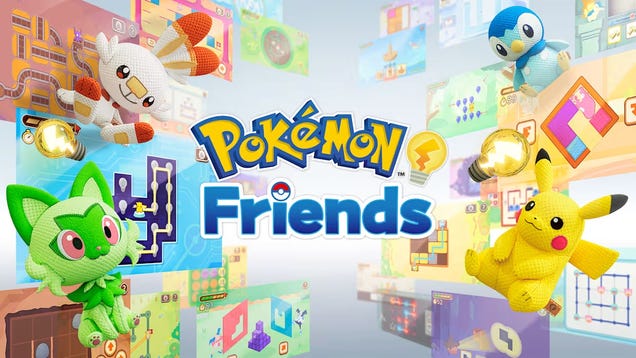It Took Me 10 Minutes To Hit A Paywall In The New Free-To-Play Pokémon Puzzle Game
Pokémon Friends: A "Free-to-Play" Game That's Anything But Free

The term "free-to-play" is often misleading. Many games marketed as such should more accurately be called "free-to-try." They offer a basic experience, but to truly enjoy the game, players are constantly pressured to spend money. Pokémon Friends, a mobile puzzle game and plush collector, exemplifies this frustrating trend. While undeniably cute and clearly aimed at young children, its relentless pursuit of revenue overshadows any genuine enjoyment.
Gameplay: Cute, But Cloyingly Repetitive
The core gameplay loop of Pokémon Friends is simple: solve match-three puzzles to earn rewards and collect adorable Pokémon plushies. The puzzles themselves are easy to grasp, making it accessible for young players. However, this simplicity quickly becomes repetitive. After a few levels, the gameplay feels monotonous, lacking any significant challenge or innovation. The visual appeal keeps children engaged for a while, but without meaningful progression or strategic depth, the novelty wears off quickly.
While collecting the Pokémon plushies is a charming aspect, the rarity system and difficulty of obtaining certain plushies feels artificially designed to encourage spending. Obtaining rare and desirable plushies often requires significant time investment or direct monetary investment, creating an imbalance that heavily favors paying players.
Monetization: An Aggressive Approach
Pokémon Friends doesn't shy away from its monetization strategies. The game is saturated with in-app purchases, presented in a way that is highly appealing to children. Shiny buttons, attractive visuals, and constant prompts to spend money create a constant, almost overwhelming, pressure to open your wallet. This aggressive monetization, combined with the simplicity of the gameplay, raises serious concerns about its ethical implications, particularly concerning its target audience of young children who might not fully grasp the implications of in-app purchases.
The game offers various in-game currencies, which can be acquired through gameplay or purchased directly. However, the rate at which these currencies are earned through gameplay is deliberately slow, making purchasing them the only viable option for players wanting to progress at a reasonable pace or collect rarer items. This creates a pay-to-win dynamic, where players who spend money significantly outpace those who don't.
Furthermore, the game often presents enticing deals, limited-time offers, and enticing loot boxes, leveraging psychological tactics to encourage impulsive spending. These strategies, often seen as manipulative, exploit the desire for immediate gratification and the fear of missing out (FOMO).
The Targeting of Young Children: Ethical Concerns
The game's blatant targeting of young children is a major point of concern. The cute visuals, simplistic gameplay, and popular Pokémon characters are all calculated to appeal to a young audience. However, this target demographic is particularly vulnerable to manipulative in-app purchase tactics. Children lack the financial understanding and self-control to make informed decisions about spending, making them easy prey for these predatory monetization techniques.
The lack of clear and easily accessible information regarding in-app purchases, coupled with the game's design that actively encourages impulsive spending, further exacerbates these ethical concerns. Parents need to be particularly vigilant when allowing young children to play Pokémon Friends, as the potential for accumulating significant costs without their knowledge is very real.
Comparison to Other Pokémon Games
Unlike other Pokémon games which generally offer a more complete experience even without microtransactions, Pokémon Friends feels fundamentally designed around extracting as much revenue as possible. While other Pokémon titles offer expansive gameplay and compelling stories, Pokémon Friends lacks both, relying solely on its visual appeal and the brand recognition of the Pokémon franchise to lure in players.
Other mobile games targeting a similar demographic often exhibit similar monetization models. However, Pokémon Friends stands out due to the sheer aggressiveness of its monetization strategy and its blatant disregard for the potential negative impact on young children. The game leverages the established trust and affection associated with the Pokémon brand to exploit its young fanbase.
Overall Impression: Avoid Unless You're Prepared to Spend
Pokémon Friends presents a compelling visual appeal that captivates young children. The simple match-three gameplay is initially engaging, but quickly becomes repetitive and frustrating. However, the overwhelming pressure to spend money, the manipulative monetization tactics, and the questionable ethical implications severely detract from any enjoyment. The game feels less like a fun pastime and more like a cleverly disguised money-making machine. Unless you're prepared to spend considerable amounts of money, it's best to avoid Pokémon Friends altogether.
For parents, it's crucial to monitor your children's gameplay closely and set strict limits on in-app spending. The game's design actively encourages impulsive purchases, and children may not fully understand the financial implications of their actions. Consider exploring alternative, more ethical and child-friendly games that prioritize fun and engaging gameplay over aggressive monetization.
In conclusion, while Pokémon Friends might superficially seem like a harmless, cute game, its reality is far different. Its aggressive monetization strategies, targeted towards a particularly vulnerable audience, overshadow any positive aspects. Players should approach this "free-to-play" game with extreme caution, and parents should be especially vigilant in monitoring their children's interactions with it.
Read more detailed reviews and analyses at these links:
Kotaku Review of a related Pokémon game
Kotaku Review of Pokémon Friends
from Kotaku
-via DynaSage

